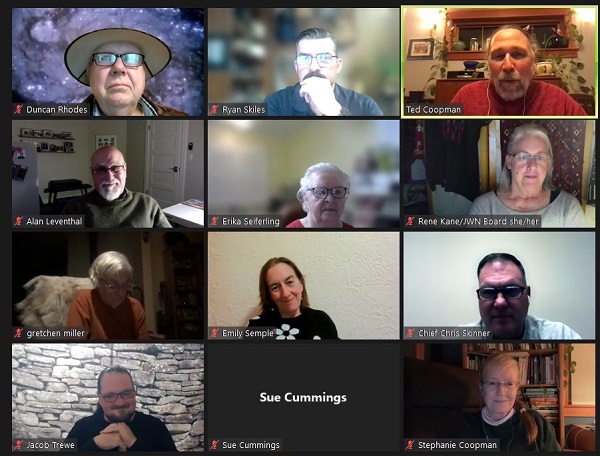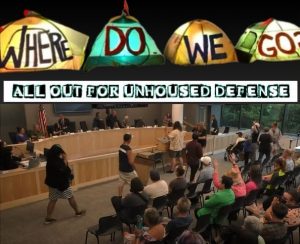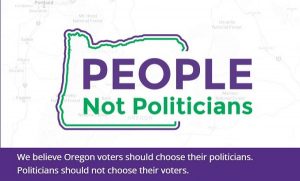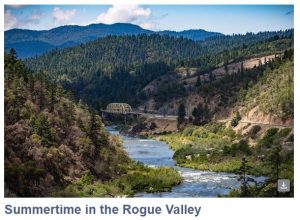EPD: Trespass calls up 17% in Jefferson Westside
7 min read
At the Jefferson Westside meeting in November, the latest from Eugene Police Department.
[00:00:06] Margaret Mazzotta (EPD): Sometimes any city bureaucracy can be hard to navigate, including the police department. And if you feel like you’re stuck or you need some help navigating, or you have a question about something, I’m also a person to call for that and hopefully help you navigate the system. And the best way to get ahold of me is (541) 682-5761.
[00:00:27] If you have been the victim of a burglary, you probably have gotten a call from me, and I do like to come out before bad things happen, but I will come out to your house and together we’ll brainstorm some ideas to make you less susceptible to burglaries and other property theft. Also, if you go to our website, and under ‘Community Engagement Team,’ there’s several videos on various topics such as personal safety and ways to protect your business and cars and that sort of thing, and oftentimes people will find those videos helpful.
[00:01:03] Chief Chris Skinner (EPD): One of the things that we’re struggling with right now is that it may not be a shock to you, is that we’re down 25 bodies. We don’t have 25 police officers that do this meaningful work, mostly on patrol to be able to answer calls for service. And it could take a long time to get back up to full staff, so that’s a big pain point for us.
[00:01:20] We’re really working on the CSO, the Community Service Officer position, which we think is a critical position for us to meet some of the more livability needs in our communities and especially the people that are victims of lower-level crimes that maybe don’t have a suspect or we’re not quite sure when those crimes occurred.
[00:01:36] We need to be able to send people out to do those investigations and connect with our community members. In 2018, we had five people that did that work. And now, we’re going to end up with 24 of those individuals that can be in and around our community and neighborhoods to be able to answer those calls for service.
[00:01:53] We continue to also be mindful of car camping, RV camping. There’s not a lot of motivation to tow these cars and these RVs because they’re not worth much, if anything. If people walk away from them, quite frankly, then we have to decommit them and enlist hazmat and recycle those, especially the RVs, which have so much hazardous waste in them, that it makes it really, really tough.
[00:02:16] You know, if you want to move them, you’ve got people living in these and now you’re bringing into play a whole set of different circumstances around somebody’s ‘dwelling’, as the law would define. And you’re not going to tow a vehicle while somebody’s in it. And so now you have to write a search warrant and be able to extract them for that. And there’s just a lot of nuance to some of the things that we’re trying to do.
[00:02:36] The other piece of that is our tent camping. I’ve taken a couple of officers out of the patrol division, and we have developed what we call our housing service officers to take those trespass calls, people camping where they shouldn’t be camping and right-of-way camping to try and find them a better place to camp which is legal, whether it’s a safe sleep site or a rest stop.
[00:02:57] And in those cases that they choose not to go to those, that we just, we ask them to move along. We have north of 1,000 spots for people in and around the city and people just are choosing not to go there. And so what you’re left with is just asking them to move and getting to a place where they choose to go somewhere else. And I hate the fact that that’s a strategy, but that’s kind of where we’re at, is, we’re never going to be able to build enough capacity for everybody, and not everybody’s going to say yes.
[00:03:24] Ryan Skiles (EPD): I’m Ryan Skiles. I’m the manager of the Crime Analysis Unit over at EPD. We take a look at statistics and try and gauge how things are going in particular areas. And then I compare that to the same period last year, because everything in Eugene (and everywhere else) is seasonal. During the summer we see different crimes than we see during the winter, than we see during the spring, and everything else.
[00:03:44] So total calls for service: You guys (Jefferson Westside neighborhood) are actually down by about 12% for the last six months versus the same period back in 2021. Number one call is ‘criminal trespass,’ an increase of about 17% over 2021, and this is kind of a trend that we’ve seen across the city as far as these types of calls. After that is ‘beat information,’ 23% increase. It’s the public calling into the police department and providing information, and more often than not, it’s regarding drug use, drug sales. So it’s kind of a tip for the police.
[00:04:15] ‘Illegal camping’ is your third most-prevalent call type, and there has been a huge spike, 108% increase over where we were back in ‘21. Another high-prevalence call that you guys have is ‘disputes’: altercations, verbal or otherwise, that are occurring between individuals, and there was no change over ‘21, but it’s still right on par with illegal camping. It was actually tied for number four.
[00:04:41] The final one in your top five is ‘patrol checks,’ up by about 12% over the same period last year, is typically actually a good thing because it means that you have more officers out in the neighborhood.
[00:04:52] John Q: Ryan was asked to report on catalytic converters, property crime, and calls at Monroe Park.
[00:04:57] Ryan Skiles (EPD): Catalytic converter thefts continue to be a bane. Most commonly Priuses, especially earlier-model Priuses, and large trucks like F-250s, F-350s—Fords in particular—and really, the only way that can be combated is to shut down the pipelines for selling them. We do have catalytic converter thefts occur. I know several people who have had their cats stolen.
[00:05:18] One of the other functions of the Crime Analysis Unit is the Pawn Program. Basically, whenever something is pawned, not only in Eugene, but pretty much anywhere in Oregon, a record of that gets sent to the police department. Jenny reads every single property crime report that comes across her desk, is absolutely fabulous with this, and she’ll piece it together and it really helps us to help you get your property back if you do simple things like keeping serial numbers, keeping a list of the property that goes on out there and then reporting it and being able to give us that information so that we can help you when stuff like that happens. One of the best ways to help yourself is good record keeping and being communicative with those records.
[00:06:04] I took Monroe Park and what kind of calls were coming in there. Patrol checks, again, are up fairly significantly, about 20%. There is a fairly high prevalence of disputes within the area: About 10% of the total disputes within the geographic area of your neighborhood are occurring just in Monroe Park. And then illegal camping was pretty much flat as compared to last year, very little change within the park itself or within the immediate vicinity of the park. And I know that we have park officers who are out there helping with some of that a little bit.
[00:06:39] Duncan Rhodes (Jefferson Westside): I would’ve hoped that you would be going into the CAHOOTS reports, and they can strip all the names out and so forth, but you at least ought to be capturing what actually happened rather than just ‘CAHOOTS had a call.’
[00:06:55] Chief Chris Skinner (EPD): You’re absolutely correct… at this point, getting data from CAHOOTS has been hard at best.
[00:07:02] They provide an invaluable service to this community and fill a gap for us in the public safety system, there’s no question about that, but we have to get to a place where we better understand what it is they’re doing, where they’re doing it, and the details of that.
[00:07:15] In some cases they refuse to share information with us, citing HIPAA, which is a very, very liberal definition of what protected health information is.
[00:07:26] The other thing that we’re really interested in doing is getting CAHOOTS really narrowly focused on responding to behavioral health crisis. And if we can make sure that we’re sending the vans to actual behavioral health crisis, we’ll actually get I think a better service and a more robust service citywide from our CAHOOTS partners.
[00:07:43] John Q: Chief Skinner was asked about red light cameras.
[00:07:46] Chief Chris Skinner (EPD): My experience has been that that’s been a policy decision by the council to bring in that type of technology… We’ve had no discussions at my level or with council about red light cameras.
[00:07:56] John Q: EPD reports to Jefferson Westside at the November neighborhood meeting.




